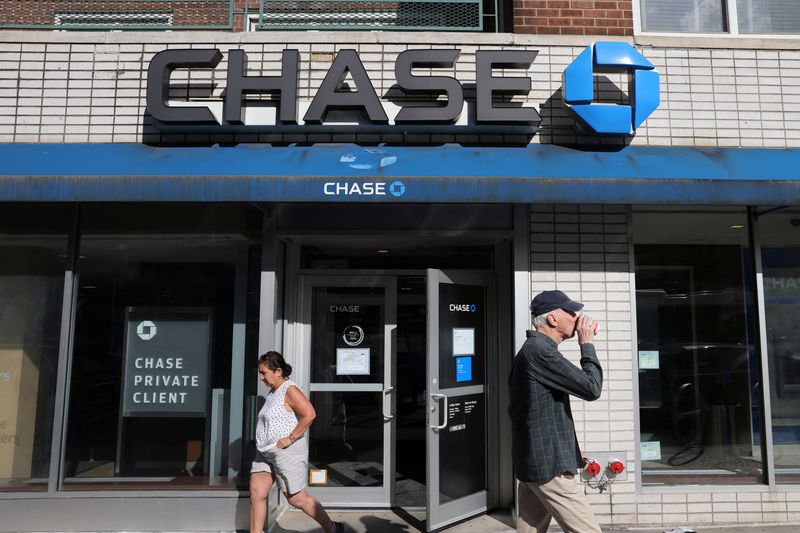U.S. banks take hit on leveraged loans as deals slump, rates rise
2022.07.19 01:33
2/2

FILE PHOTO: People walk by a Chase bank branch in Manhattan, New York City, U.S., June 29, 2022. REUTERS/Andrew Kelly
2/2
By Saeed Azhar and Elizabeth Dilts Marshall
NEW YORK (Reuters) – U.S. banks have started taking a hit on their leveraged loans’ exposure as the outlook for dealmaking turns sour amid rising interest rates and extreme market volatility caused by the Russian invasion of Ukraine.
Bank of America (NYSE:BAC) disclosed on Monday it is reducing its leveraged loan exposure from the $300 million mark, Citigroup Inc (NYSE:C) wrote down $126 million in the second quarter and Wells Fargo (NYSE:WFC) & Co took a $107 million writedown due to widening of credit spreads.
Leveraged loans are usually taken out by companies that have high levels of debt, usually with non-investment grade credit ratings. They tend to be used by private equity firms as a way to fund acquisitions of such companies.
A widening of the credit spread means mark-to-market losses for banks or even worse – a realised loss if a loan on their books turns sour, analysts say.
“The market turmoil and abrupt slowdown in the second quarter sparked a downturn in the leveraged finance markets, causing a number of the deals across various market participants to get marked down,” Bank of America’s chief financial officer, Alastair Borthwick, said on an earnings call on Monday.
Citigroup CFO Mark Mason said last week the leveraged finance segment is under a considerable amount of pressure in this environment.
“We’re not a big player here. We did take a writedown in the quarter, about $126 million,” he said.
Wells Fargo said on Friday its investment banking fees declined, reflecting lower market activity and the $107 million writedown on “unfunded leveraged finance commitments” due to the market spread widening.
Inflation exacerbated by supply-chain issues and geopolitical developments is weighing on credit profiles, along with slower economic growth and tightening monetary policy, said Lyuba Petrova, head of U.S. leveraged finance at Fitch Ratings.
The market is also slowing.
Leveraged loans fell to $737 million in the first half of the year, down from $883 million a year ago, data from Dealogic shows.
BNP Paribas (OTC:BNPQY) strategists in a note said the Federal Reserve’s rate hikes are no longer creating more demand, but may worsen interest coverage ratios – a debt and profitability ratio used to determine how easily a company can pay interest on its outstanding debt.
The U.S. central bank has been trying curb a relentless surge in prices and has committed to a “soft landing.”
In June, the Fed raised its benchmark federal funds rate by 75 basis points, the biggest hike since 1994, as inflation unexpectedly rose despite expectations it had peaked.







